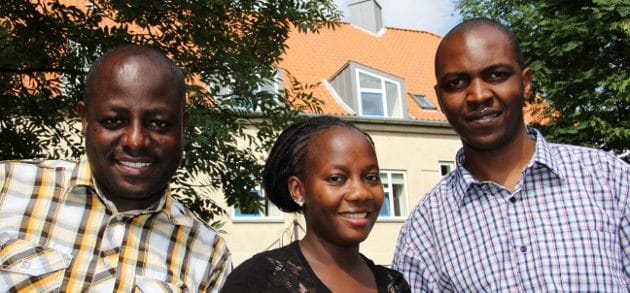Practical studies easy to apply in real life
12-09-13

The very last students of the Emerging Leaders Scholarship Programme air their views on studying and living in Denmark.
Text and photos: Jan Kjær, Better-World.dk
The Emerging Leaders Scholarship Programme (ELSP) has come to end. It began back in 2007, and in June 2013 the last students of the programme graduated and obtained a M.Sc. Agribusiness and Food Economics from the University of Copenhagen.
DFC newsletter met with three of them on a sunny day at Frederiksberg to hear how they have benefitted both when it comes to their studies and their stay in Denmark.
Enock Robert Wagala, Tanzania
How were your studies?
“I think that the studies were more practical in the sense that what you learn in class is what you can apply in real life. The students are being prepared to work in real situations. Not so theoretically. That is exactly where you find the big difference from studying in Tanzania.”
“The contents were useful. In my case, I missed one thing; to write my thesis properly. If we had had research courses it would have been easier to write my thesis.”
… and living in Denmark?
“What really strikes me is the Danish weather conditions. The very first time we arrived here, the sun was shining outside until 10pm. In our countries the sun is out 12 hours all year round. Although it has been cold, the weather has suited me well. When it was snowing during winter I really liked it.”
“In Denmark you face the issue of punctuality. I like the way Danes agree to meet with someone. If it is at 10, it is 10 o’clock. Not like in our country. It seems like about 90 per cent here in Denmark respects the time of others.”
Emmanual Kilundo Nyagawa, Tanzania
How were your studies?
“The studies were real practical, so you are able to apply your knowledge directly to programmes. The literature was good and very relevant. In our country our books can be up to 15-20 years old because of the economical situation. Here in Denmark books are only 2-3 years old, meaning you are not talking about cases 15-20 years back.”
“Another thing that struck me is the narrow gap between tutors and students. The interaction is therefore very close. In our countries the gap is simply too big. Here we call the supervisor by the first name. Henning, for example. Not the title or last name. This is good and it certainly reduces the gap. Overall, hierarchy is less emphasized in Denmark.”
…and living in Denmark?
“It was very interesting in the sense that it was a new experience. The way you shop is very different from Tanzania where I come from. We have few shopping malls like in Denmark. Things are positioned in a different way. You can find so many things in one place. And then there is the use of credit cards instead of petty cash. In our country you must pay in cash all the time.”
“I was amazed by the discipline in public transport systems. Here you punch a card and nobody is checking it at that time. They pop up unexpectedly, but I travelled almost three months without seeing an attendant. You could almost be tempted not to try. But I once saw one being caught and the fine was a hefty 750 DKK equivalent to 140 US dollars.”
“In Denmark you must have discipline. All is in place. There is no hurry in Africa!”
Marris Nakayaga, Uganda
How were your studies?
“During my course I have come to appreciate how we were able to compare the situation in the developed world with the developing world. For instance, the economic impact of the economic principles and policies applied in the developed world. It gives an insight into what may happen with the policies of liberalization now being put in place in the developing countries.”
…and living in Denmark?
“What I loved the most was being at an international university with a number of students from both Europe and further away. I was able to get inputs from a number of different disciplines from other countries. I learned to use Google Translator from someone from Spain, for instance. That was really useful.”
“One thing I noted about the Danish students in my class, though, was that they are a bit reserved compared to the other students. I found that a bit odd.”
“For me it was actually more a question of being abroad in an international community rather than being in Denmark.”
Facts about ESLP
The ESLP started in 2007. Consistent with Danish policy and priorities, funding was put aside over a five-year period for scholarships to assist selected entrepreneurs and emerging business leaders from Danida’s programme countries to take the full-time Master of Business Administration (MBA) at the Copenhagen Business School (CBS), the full-time Sustainable MBA at Aarhus School of Business, Aarhus University or the Master of Science in Agricultural Economics with a focus on agribusiness at University of Copenhagen.
Read a DFC Newsletter article about ELSP here
Read more about degree studies at DFC here
Go back to our stories